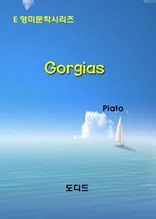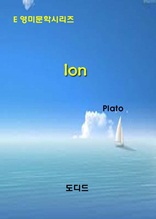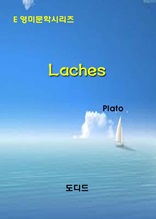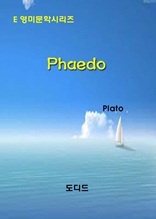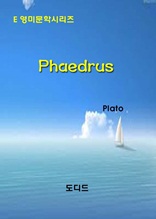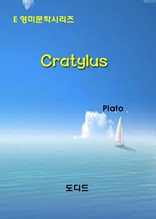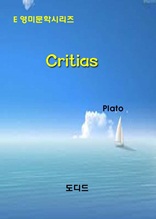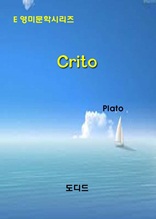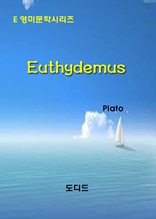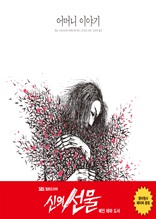Gorgias
도서정보 : Plato | 2014-03-17 | EPUB파일
지원기기 : PC / Android / iOS
Gorgias the last dialogue Plato wrote before leaving Athens features Socrates views on the sophist-philosopher debate that then raged throughout ancient Athens. In his discussion with Gorgias Polus and Callicles Socrates asserts the existence of a transcendental perfect knowledge and rejects rhetoric as the perversion of dialectic which harms the soul by creating false belief.
구매가격 : 1,000 원
Ion
도서정보 : Plato | 2014-03-17 | EPUB파일
지원기기 : PC / Android / iOS
PERSONS OF THE DIALOGUE Socrates Ion. Socrates Welcome Ion. Are you from your native city of Ephesus? Ion No Socrates but from Epidaurus where I attended the festival of Asclepius. Soc. And do the Epidaurians have contests of rhapsodes at the festival? Ion O yes and of all sorts of musical performers. Soc. And were you one of the competitors--and did you succeed? Ion I obtained the first prize of all Socrates. Soc. Well done and I hope that you will do the same for us at the Panathenaea. Ion And I will please heaven.
구매가격 : 500 원
Laches
도서정보 : Plato | 2014-03-17 | EPUB파일
지원기기 : PC / Android / iOS
The Laches (Greek Λ?χη?) is a Socratic dialogue written by Plato. Participants in the discourse present competing definitions of the concept of courage.
구매가격 : 1,000 원
Phaedo
도서정보 : Plato | 2014-03-17 | EPUB파일
지원기기 : PC / Android / iOS
After an interval of some months or years and at Phlius a town of Peloponnesus the tale of the last hours of Socrates is narrated to Echecrates and other Phliasians by Phaedo the ‘beloved disciple.’ The Dialogue necessarily takes the form of a narrative because Socrates has to be described acting as well as speaking. The minutest particulars of the event are interesting to distant friends and the narrator has an equal interest in them. During the voyage of the sacred ship to and from Delos which has occupied thirty days the execution of Socrates has been deferred. (Cp. Xen. Mem. iv. 8. 2.) The time has been passed by him in conversation with a select company of disciples. But now the holy season is over and the disciples meet earlier than usual in order that they may converse with Socrates for the last time. Those who were present and those who might have been expected to be present are mentioned by name. There are Simmias and Cebes (Crito 45 B) two disciples of Philolaus whom Socrates ‘by his enchantments has attracted from Thebes’ (Mem. iii. 11. 17) Crito the aged friend the attendant of the prison who is as good as a friend?these take part in the conversation. There are present also Hermogenes from whom Xenophon derived his information about the trial of Socrates (Mem. iv. 8. 4) the ‘madman’ Apollodorus (Symp. 173 D) Euclid and Terpsion from Megara (cp. Theaet. sub init.) Ctesippus Antisthenes Menexenus and some other less-known members of the Socratic circle all of whom are silent auditors. Aristippus Cleombrotus and Plato are noted as absent. Almost as soon as the friends of Socrates enter the prison Xanthipp? and her children are sent home in the care of one of Crito’s servants. Socrates himself has just been released from chains and is led by this circumstance to make the natural remark that ‘pleasure follows pain.’ (Observe that Plato is preparing the way for his doctrine of the alternation of opposites.) ‘Aesop would have represented them in a fable as a two-headed creature of the gods.’ The mention of Aesop reminds Cebes of a question which had been asked by Evenus the poet (cp. Apol. 20 A) ‘Why Socrates who was not a poet while in prison had been putting Aesop into verse?’?‘Because several times in his life he had been warned in dreams that he should practise music and as he was about to die and was not certain of what was meant he wished to fulfil the admonition in the letter as well as in the spirit by writing verses as well as by cultivating philosophy. Tell this to Evenus and say that I would have him follow me in death.’ ‘He is not at all the sort of man to comply with your request Socrates.’ ‘Why is he not a philosopher?’ ‘Yes.’ ‘Then he will be willing to die although he will not take his own life for that is held to be unlawful.’
구매가격 : 1,000 원
Phaedrus
도서정보 : Plato | 2014-03-17 | EPUB파일
지원기기 : PC / Android / iOS
The Phaedrus (Greek Φα?δρο?) written by Plato is a dialogue between Plato s main protagonist Socrates and Phaedrus an interlocutor in several dialogues. The Phaedrus was presumably composed around 370 BC around the same time as Plato s Republic and Symposium with those two texts it is often considered one of Plato s literary high points. Although ostensibly about the topic of love the discussion in the dialogue revolves around the art of rhetoric and how it should be practiced and dwells on subjects as diverse as reincarnation and erotic love.
구매가격 : 1,000 원
Cratylus
도서정보 : Plato | 2014-03-14 | EPUB파일
지원기기 : PC / Android / iOS
Cratylus (Κρατ?λο?) is the name of a dialogue by Plato written in approximately 360 BC. In the dialogue Socrates is asked by two men Cratylus and Hermogenes to tell them whether names are "conventional" or "natural" that is whether language is a system of arbitrary signs or whether words have an intrinsic relation to the things they signify. In doing this Cratylus became one of the earliest philosophical texts of the Classical Greek period to deal with matters of etymology and linguistics.
구매가격 : 1,000 원
Critias
도서정보 : Plato | 2014-03-14 | EPUB파일
지원기기 : PC / Android / iOS
Plato s dialogue here marks the first recorded mention of the legend of Atlantis though scholars continue to debate whether he meant it as an allegory or historical narrative. It is a dialogue between the politicians Critias and Hermocrates with the philosophers Socrates and Timaeus.
구매가격 : 500 원
Crito
도서정보 : Plato | 2014-03-14 | EPUB파일
지원기기 : PC / Android / iOS
The Crito seems intended to exhibit the character of Socrates in one light only not as the philosopher fulfilling a divine mission and trusting in the will of heaven but simply as the good citizen who having been unjustly condemned is willing to give up his life in obedience to the laws of the state...
구매가격 : 500 원
Euthydemus
도서정보 : Plato | 2014-03-14 | EPUB파일
지원기기 : PC / Android / iOS
The Euthydemus though apt to be regarded by us only as an elaborate jest has also a very serious purpose. It may fairly claim to be the oldest treatise on logic for that science originates in the misunderstandings which necessarily accompany the first efforts of speculation. Several of the fallacies which are satirized in it reappear in the Sophistici Elenchi of Aristotle and are retained at the end of our manuals of logic. But if the order of history were followed they should be placed not at the end but at the beginning of them for they belong to the age in which the human mind was first making the attempt to distinguish thought from sense and to separate the universal from the particular or individual. How to put together words or ideas how to escape ambiguities in the meaning of terms or in the structure of propositions how to resist the fixed impression of an eternal being or perpetual flux how to distinguish between words and things?these were problems not easy of solution in the infancy of philosophy. They presented the same kind of difficulty to the half- educated man which spelling or arithmetic do to the mind of a child. It was long before the new world of ideas which had been sought after with such passionate yearning was set in order and made ready for use. To us the fallacies which arise in the pre-Socratic philosophy are trivial and obsolete because we are no longer liable to fall into the errors which are expressed by them. The intellectual world has become better assured to us and we are less likely to be imposed upon by illusions of words.
구매가격 : 1,000 원
어머니 이야기
도서정보 : 한스 크리스티안 안데르센 | 2014-03-13 | EPUB파일
지원기기 : PC / Android / iOS
“제발 제 아이를 살려주세요!”
아이를 찾기 위한, 어머니의 슬프고도 아름다운 여정
안데르센의 또 하나의 명작 『어머니 이야기』, 단행본 출간!
원작의 감동을 그대로 느낄 수 있는 영어 원문 수록!
안데르센의 걸작 동화 『어머니 이야기』는 ‘죽음’의 사자, ‘밤’의 여신, 생명의 ‘커다란 온실’ 등 안데르센 특유의 상상력이 돋보이는 환상적인 이야기와 함께, 자식을 위해서라면 어떤 고통도 달게 받아들이는 어머니의 사랑을 그린 작품이다. 한국어린이도서상을 수상한 그림작가 조선경의 섬세하면서도 강렬한 그림으로 원작의 신비로운 분위기를 되살려냈다.
안데르센의 ‘어머니 이야기’는 ‘미운 오리 새끼’나 ‘성냥팔이 소녀’, ‘인어공주’, ‘눈의 여왕’ 등 안데르센의 다른 동화에 비해 국내 독자들에게 친숙한 작품은 아니다. 원작은 1847년에 처음 발표되었으며, 영미 유럽권에서는 이미 여러 차례 영화화된 바 있다. 한국에는 주로 ‘안데르센 동화집’의 여러 편 중 하나의 이야기로 소개된 정도이고, 단독으로 번역된 책 가운데 원작을 개작하지 않은 단행본은 이 책이 유일하다.
『어머니 이야기』는 안데르센의 동화 중에서도 뛰어난 작품성을 인정받은 숨은 명작으로, 아이를 데려간 ‘죽음’으로부터 아이를 되찾아오기 위해 자신의 모든 것을 내주며 동분서주하는 한 어머니의 절절한 모성을 담고 있다. 또한, 『어머니 이야기』는 가까운 이의 ‘죽음’이라는 인생의 통과의례를 모티브로 하여 슬픔, 절망, 인정이라는 애도의 과정이 그려지면서 독자에게 깊은 여운을 남긴다. 그만큼 안데르센이 인생의 기쁨과 즐거움뿐만 아니라 슬픔과 시련을 다루는 데에도 뛰어나다는 사실을 여실히 보여주는 걸작이다.
안데르센 자신이 “내가 쓴 이야기들은 어린이를 위한 것일 뿐만 아니라 어른을 위한 것이기도 하다”라고 했듯이, 『어머니 이야기』는 어른이 함께 읽기에 충분한 감동과 깊이가 있는 동화이다. 어린이 독자는 상상력 넘치는 이야기 자체가 주는 즐거움을 만끽하고, 어른 독자는 한 편의 이야기 속에 담긴 삶과 죽음에 관한 심오한 철학과 강인한 모성의 힘에 감동을 받을 것이다.
“어떻게 나보다 먼저 여기에 올 수 있지?”
“전 엄마니까요!”
절박한 상황에서도 굴하지 않는 모성의 힘을 예찬하다
어느 추운 겨울밤, 가난한 어머니가 아픈 아이를 돌보고 있다. ‘죽음’의 사자가 찾아와 아이를 데려가버리고, 어머니는 절박한 마음으로 아이를 찾아 나서면서 이야기는 시작된다.
죽음의 사자를 찾아 나선 어머니의 여정은 안데르센 특유의 상상력과 결합하여 마치 구전설화와 같이 친근하면서도 신비하다. 아이에게 들려준 자장가를 한 곡도 남김없이 모두 불러달라는 ‘밤’의 여신, 자신을 품에 안아 따뜻하게 해달라는 ‘가시나무’, 밝게 빛나는 어머니의 두 눈을 요구하는 ‘커다란 호수’, 검고 긴 아름다운 머리칼을 자신의 흰머리와 바꾸자는 ‘온실의 할멈’까지, 어머니는 아이를 찾기 위해서라면 자신의 모든 것을 기꺼이 내어준다. 모성의 본질을 가장 정확하게 드러내고 있는 대목으로, 아이를 잃은 고통과 슬픔, 아이를 되찾기 위한 절박한 심정이 생생하게 와 닿는다.
어렵게 찾아간 ‘죽음’의 온실에서 어머니는 아이를 되찾아올 수 있었을까? 탁월한 이야기꾼인 안데르센은 이야기를 극한으로 몰아가며 주인공 ‘어머니’를 딜레마에 빠트린다. ‘죽음’은 어머니에게 두 아이의 미래를 보여준다. 행복으로 가득한 삶과 궁핍과 불행, 죄로 가득한 삶. 둘 중 하나는 어머니의 아이가 겪을 미래라고 말한다. 도대체 둘 중 누가 내 아이란 말인가? 어머니는 혼돈에 빠진다. 아이를 데려와야 할까, 하느님이 계신 ‘미지의 땅’으로 보내야 할까? 독자는 한 편의 동화를 통해 탄탄한 구조로 짜여진 이야기의 힘을 맛볼 수 있다.
상실감과 슬픔을 치유하는 이야기의 힘
불후한 어린 시절을 보낸 안데르센은 그 시절 가난한 집의 살림살이를 누구보다 잘 알고 있었다. 저자는 가난한 어머니가 아픈 아이를 죽음으로 떠나보내는 과정을 비참한 현실을 그대로 드러내는 방식이 아닌 신비롭고 환상적인 모티브와 함께 한 편의 아름다운 이야기로 승화시켰다. 안데르센은 아이를 잃은 어머니의 슬픔과 상실감이 어떤 것인지 ‘괘종시계의 큰 시계추가 떨어지며 시계가 멈춰버렸다’와 같은 비유와 상징으로 표현한다. ‘어머니’가 상실감과 슬픔을 치유해나가는 과정을 따라가다 보면 슬픔을 딛고 다시 새롭게 시작하는 법을 배우게 된다.
충실한 번역으로 원작의 감동을 그대로 전한다
안데르센은 평생 212편의 동화를 발표했는데, 그 중에는 엽기적인 동화로 오해 받는 작품들이 있다. 안데르센의 동화가 항상 권선징악의 행복한 결말로 끝나는 것은 아니기 때문이다. 행간의 숨은 의미를 이해한다면 새드엔딩인 작품들도 인생에 관한 심오한 철학을 담고 있음을 알 수 있다. 그만큼 번역의 역할이 중요하다. 『어머니 이야기』 역시 자칫 한국인의 정서로는 이해할 수 없는 스토리가 될 수도 있었지만, 번역자 강신주의 충실한 번역을 통해 ‘어머니’의 심리를 고스란히 전달하여 작가의 의도를 파악할 수 있도록 했다.
책의 말미에 수록한 〈옮긴이의 글〉은 작품 해설이라 해도 과언이 아닐 만큼 이야기에 담긴 비유와 상징의 의미를 이해하는 데 도움을 준다. 그 밖에도 『어머니 이야기』에는 영문판 텍스트를 삽지로 제공하여, 한글판과 비교하며 원작의 분위기를 느낄 수 있도록 했다.
꿈과 환상의 세계를 독창적으로 표현한 그림
『어머니 이야기』는 예술적이고 독창적인 표현으로 인정받아온 그림작가 조선경의 인상적인 11컷의 그림을 담고 있다. 『마고할미』로 한국어린이도서상 일러스트레이션부문 문화체육부장관상을 수상한 그림작가 조선경은 『파랑새』, 『지하 정원』 등 이국적이면서도 몽환적인 터치가 돋보이는 그림으로 자신만의 작품세계를 선보여 왔다. 이 책에서도 순간의 이미지를 독창적이면서 세밀한 방식으로 표현하며 아이를 잃은 어머니의 슬픔과 절망, 아이를 되찾기 위한 의지와 강건한 마음을 생생하게 전달하고 있다.
구매가격 : 8,960 원

